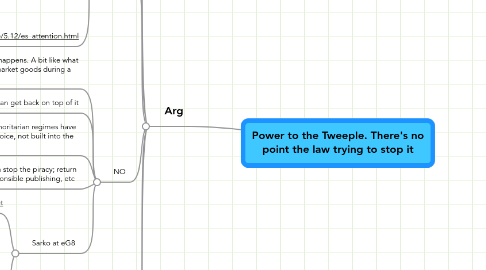
1. Arg
1.1. YES
1.1.1. Power to the Tweeple.
1.1.2. Giggs affair, "sue the grapevine"
1.1.3. law could never ban gossip; we're now in the global village
1.2. NO
1.2.1. Twitter lacks credibility
1.2.2. Scotsman, Parliament
1.2.3. Judge recognises that there is a difference
1.2.4. Justice Turgenhardt
1.2.4.1. It is obvious that if the purpose of this injunction were to preserve a secret, it would have failed in its purpose. But in so far as its purpose is to prevent intrusion or harassment, it has not failed. The fact that tens of thousands of people have named the claimant on the internet confirms that the claimant and his family need protection from intrusion into their private and family life. The fact that a question has been asked in Parliament seems to me to increase, and not to diminish the strength of his case that he and his family need that protection. The order has not protected the claimant and his family from taunting on the internet. It is still effective to protect them from taunting and other intrusion and harassment in the print media.
1.2.4.2. http://www.bailii.org/ew/cases/EWHC/QB/2011/1334.html
1.3. YES
1.3.1. That won't last. More general point is that tech has now made is such that info goes to where it captivates most
1.3.2. Wikileaks, music
1.3.3. Attention economics
1.3.3.1. http://www.zmogo.com/web/is-the-attention-economy-the-new-currency/
1.3.3.2. In the Attention Economy, your value is no longer determined by your net worth… but more importantly…by your NET worth. Since the Internet encompassed our lives, think about how inexpensive it is for an individual or a corporation to disseminate their message to the masses. The paradigm has shifted. All of sudden talk is cheap, and it’s listening that garners significant value. Man needs interaction to determine his or her self worth. And no fat wallet is going to make us feel better about ourselves unless it is coupled with a little ‘attention currency.’
1.3.4. http://www.wired.com/wired/archive/5.12/es_attention.html
1.4. NO
1.4.1. That may be what happens. A bit like what happens to supermarket goods during a looting episode
1.4.2. But the law can get back on top of it
1.4.3. Key is anonymity. Authoritarian regimes have shown that this is a choice, not built into the technology
1.4.4. We can stop the piracy; return to responsible publishing, etc
1.4.5. Sarko at eG8
1.4.5.1. http://www.computing.co.uk/ctg/news/2073376/eg8-sarkozy-talks-governments-role-regulating-internet
1.4.5.2. "Now that the internet is an integral part of most people's lives, it would be contradictory to exclude governments from this huge forum," said Sarkozy in his opening address. "Nobody could, nor should, forget that these governments are the only legitimate representatives of the will of the people in our democracies," he added. "To forget this is to take the risk of democratic chaos and hence anarchy." The French President also went on to tell delegates that their level of responsibility is "undoubtedly the highest ever given to individuals who do not work in the public sector or as state representatives".
1.5. YES
1.5.1. Not true. Even telecoms stranglehold going with WiMax
1.5.2. And anyway, the social choice has been to go with this experience in freedom & self organisation
1.5.2.1. The Internet is the continuation of the Enlightenment
1.5.3. This is the destiny of man
1.5.4. Zittrain
1.5.4.1. Our fortuitous starting point is a generative device in tens of millions of hands on a neutral Net. To maintain it, the users of those devices must experience the Net as something with which they identify and belong. We must use the generativity of the Net to engage a constituency that will protect and nurture it. That constituency may be drawn from the ranks of a new generation able to see that technology is not simply a video game designed by someone else, and that content is not simply what is provided through a TiVo or iPhone.
1.5.4.2. http://yupnet.org/zittrain/archives/21
1.6. NO
1.6.1. Mad, Randian rantings!
1.6.2. get real on the importance of this stuff
1.6.3. Mill, the steam press and the railways
1.6.3.1. Newspapers and railroads are solving the problem of bringing the democracy of England to vote, like that of Athens, simultaneously in one agora.
1.6.3.2. http://oll.libertyfund.org/?option=com_staticxt&staticfile=show.php%3Ftitle=233&chapter=16544&layout=html&Itemid=27
1.6.4. The constants of human existence are more important than the changes
